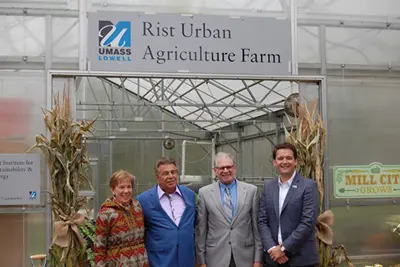Urban Agriculture Program, Mill City Grows Provide Produce to Community During Pandemic
 Image by Mill City Grows
Image by Mill City Grows
04/20/2020
By Ed Brennen
Everything is pleasant inside the Rist Urban Agriculture Greenhouse. The air is warm and tranquil, filled with fresh, earthy notes from the spring seedlings of tomato plants, scallions, ginger and turmeric. The only sound is the muffled white noise of the nearby Merrimack River.
Here, inside the university’s greenhouse on East Campus, one almost forgets about the coronavirus chaos consuming the world outside the structure’s translucent polycarbonate walls.
“The greenhouse is a delightful place to work right now,” says Ali Jacobs, director of programs for Mill City Grows, the Lowell-based urban farming nonprofit that manages the site in partnership with the university’s Office of Sustainability. “There’s little in the world that’s better for reducing anxiety than watering some baby vegetables.”
When Mill City Grows Executive Director Jessica Moore-Wilson learned that most of the university would be closing temporarily in mid-March because of the pandemic, the first person she called was Director of Sustainability Ruairi O’Mahony. She needed to know if her small team of staff members would still have access to the greenhouse and urban farm, where seedlings have been growing all winter.
“This moment has made it crystal clear how important it is to the community to have a local food system that can withstand these kinds of external economic pressures.” -Mill City Grows’ Jessica Moore-Wilson
“The greenhouse is really the catalyst for our ability to start our growing season. It’s a really important space for us,” says Moore-Wilson, who was relieved to learn that her staff would still have access to the site.
The fresh, healthy produce that originates from the university’s greenhouse is more important than ever to the local community. With tens of millions of American workers losing their jobs because of the coronavirus pandemic, the issue of food insecurity is growing — including in Lowell.
At the same time, the pandemic has broken the nation’s food supply chain. Farms that produce staples like eggs, milk and potatoes for restaurants, hotels and schools across the country have suddenly lost their business. Unable to quickly and efficiently divert their yield to food banks and shelters, which are seeing record demand, farmers in some parts of the country are instead being forced to destroy millions of pounds of fresh food.
 Image by Tory Wesnofske
Image by Tory Wesnofske
It’s a cruel irony that Mill City Grows has been able to avoid. In early April, their staff transplanted seedlings for 9,000 scallions, 6,000 onions and 300 beets from the greenhouse to their main farm in the city’s Pawtucketville neighborhood, where the crops will continue to grow until harvest.
“This moment has made it crystal clear how important it is to the community to have a local food system that can withstand these kinds of external economic pressures,” Moore-Wilson says.
Co-founded in 2011 by alum Lydia Sisson ’12, Mill City Grows normally sells produce to the community through its Mobile Market program. For the safety of its workers and customers, however, it has converted to an online ordering system. Customers can place their orders for carrots, spinach, kale and more and schedule a contactless pickup on Wednesdays and Fridays outside the organization’s home office at the Wannalancit Business Center on East Campus.
According to Moore-Wilson, many customers use the federal Supplemental Nutrition Assistance Program (SNAP) and the state Healthy Incentives Program (HIP) to pay for their food purchases.
 Image by Ed Brennen
Image by Ed Brennen
“We know there are so many people right now that have lost jobs or have been furloughed, and they’re facing all kinds of obstacles,” Moore-Wilson says. “Our mission is to help get food to the people who need it.”
Of the first 75 orders placed online, 40 percent of customers did not have to pay, while 19 percent used SNAP and HIP benefits.
O’Mahony is happy to see the university’s partnership with Mill City Grows providing some hope — and nourishment — to the community during the COVID-19 crisis.
“It’s great to see the greenhouse is in full production mode and producing food around the clock for the community,” he says.




